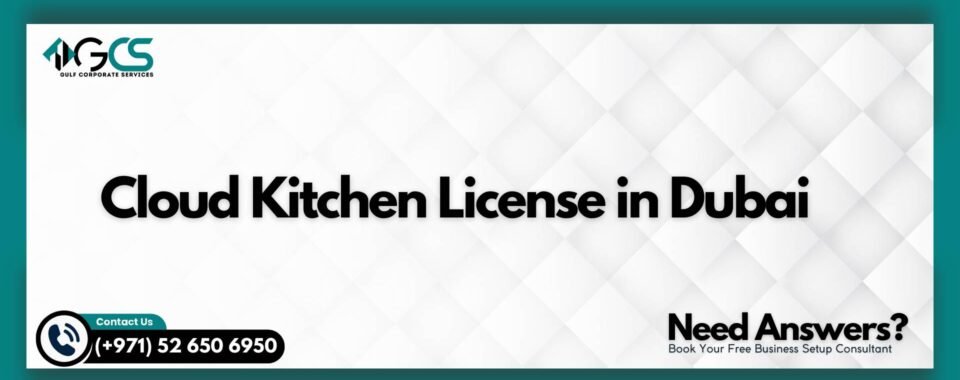
The culinary landscape in Dubai is evolving rapidly, with cloud kitchens gaining immense popularity. Also known as ghost kitchens or virtual kitchens, these delivery-only food businesses are revolutionizing the way entrepreneurs enter the food and beverage industry. Obtaining a cloud kitchen license in Dubai is a critical step for anyone looking to capitalize on this trend. This article provides a detailed guide on securing a cloud kitchen license in Dubai, covering requirements, processes, costs, and more. Whether you’re a budding entrepreneur or an established restaurateur, this guide will help you navigate the licensing process with ease.
What is a Cloud Kitchen?
A cloud kitchen is a commercial kitchen designed exclusively for preparing food for delivery, with no dine-in facilities. Unlike traditional restaurants, cloud kitchens focus on online orders through platforms like Talabat, Deliveroo, or Zomato. This model reduces overhead costs, eliminates the need for a prime storefront, and allows businesses to scale efficiently. In Dubai, the demand for cloud kitchens has surged due to the city’s fast-paced lifestyle and growing reliance on food delivery services.
Why Choose a Cloud Kitchen in Dubai?
Dubai’s diverse population, high disposable income, and tech-savvy consumers make it an ideal market for cloud kitchens. The city’s strategic location, world-class infrastructure, and supportive business environment further enhance its appeal. Entrepreneurs benefit from lower setup costs compared to traditional restaurants, as there’s no need for expensive interior design or front-of-house staff. Additionally, Dubai’s regulatory framework is streamlined, making it easier to obtain a cloud kitchen license compared to other global cities.
Types of Cloud Kitchen Licenses in Dubai
To operate a cloud kitchen in Dubai, you need a valid commercial license. The type of license depends on your business structure and location. Below are the main options available.
Mainland Cloud Kitchen License
A mainland license allows you to operate a cloud kitchen anywhere in Dubai, except in free zones. Issued by the Dubai Department of Economic Development (DED), this license offers flexibility in choosing your location and target market. It’s ideal for entrepreneurs who want to serve a broad customer base across the city. The mainland license also allows you to partner with multiple food delivery platforms and expand your operations without geographical restrictions.
Free Zone Cloud Kitchen License
Free zone licenses are issued by specific free zone authorities, such as Dubai Multi Commodities Centre (DMCC) or Dubai South. These licenses are suitable for businesses targeting international markets or those seeking 100% foreign ownership. Free zones offer tax exemptions, full profit repatriation, and simplified setup processes. However, your cloud kitchen must operate within the free zone’s jurisdiction, which may limit your delivery radius.
Freelance Cloud Kitchen License
For individuals looking to start small, Dubai offers a freelance license for home-based cloud kitchens. This option is cost-effective and ideal for testing a business concept. However, it comes with restrictions, such as limited scalability and the need to operate from a residential kitchen that meets strict hygiene standards.
Steps to Obtain a Cloud Kitchen License in Dubai
Securing a cloud kitchen license in Dubai involves several steps. Following these steps ensures compliance with local regulations and a smooth setup process.
Step 1: Define Your Business Activity
The first step is to specify your business activity. For a cloud kitchen, the primary activity is “food preparation and delivery.” You’ll need to register this activity with the DED or the relevant free zone authority. Be clear about your menu and operational model, as this will impact the approvals required.
Step 2: Choose a Business Name
Select a trade name that complies with Dubai’s naming regulations. The name should not include offensive words, religious references, or abbreviations of your personal name. Once chosen, submit the name for approval through the DED or free zone portal.
Step 3: Apply for Initial Approval
Submit an application for initial approval to the DED or free zone authority. This step confirms that your business activity and trade name are permissible. You’ll need to provide basic documentation, such as your passport copy and business plan.
Step 4: Secure a Kitchen Facility
Your cloud kitchen must operate from a commercial kitchen that meets Dubai Municipality’s food safety standards. You can lease a ready-to-use kitchen from providers like Kitopi or Kitchenomiq or set up your own facility. Ensure the kitchen has proper ventilation, fire safety equipment, and hygiene certifications.
Step 5: Obtain Food Safety Approvals
Dubai Municipality requires cloud kitchens to comply with strict food safety regulations. You’ll need to obtain a Food Control Department approval, which involves kitchen inspections and staff training in food handling. All staff must hold a valid Food Safety Training Certificate.
Step 6: Final License Application
Once you have initial approval and a compliant kitchen, submit your final license application. This includes signing a tenancy contract for your kitchen space, submitting Emirates ID copies, and paying the license fee. The DED or free zone authority will issue your license within a few days.
Costs of Obtaining a Cloud Kitchen License in Dubai
The cost of a cloud kitchen license varies depending on the license type and location. Below is a breakdown of the key expenses.
License Fees
- Mainland License: Approximately AED 10,000–15,000, including DED fees and initial approval costs.
- Free Zone License: Ranges from AED 12,000–20,000, depending on the free zone and package.
- Freelance License: Starts at AED 7,500, making it the most affordable option.
Additional Costs
- Kitchen Rental: Ready-to-use kitchens cost AED 5,000–15,000 per month, depending on size and location.
- Food Safety Compliance: Inspection and training costs range from AED 1,000–3,000.
- Visa Costs: If you need employee visas, expect to pay AED 3,000–5,000 per visa.
- Miscellaneous Fees: Include trade name registration (AED 1,000–2,000) and Ejari (tenancy contract registration) fees (AED 1,500–3,000).
Key Requirements for a Cloud Kitchen License
To ensure a smooth licensing process, you must meet specific requirements set by Dubai authorities.
Legal Documentation
You’ll need a valid passport, Emirates ID (if applicable), and a No Objection Certificate (NOC) from your sponsor if you’re not a UAE resident. For mainland licenses, a local service agent may be required for certain nationalities.
Kitchen Compliance
Your kitchen must adhere to Dubai Municipality’s guidelines, including proper waste disposal, pest control, and fire safety measures. Regular inspections ensure ongoing compliance.
Staff Training
All kitchen staff must complete a food safety training program certified by Dubai Municipality. This ensures your team is equipped to handle food safely and maintain hygiene standards.
Benefits of Operating a Cloud Kitchen in Dubai
Running a cloud kitchen in Dubai offers numerous advantages for entrepreneurs.
Low Overhead Costs
Without the need for a dine-in space, you save on rent, decor, and front-of-house staff. This allows you to allocate more resources to menu development and marketing.
High Demand for Food Delivery
Dubai’s residents rely heavily on food delivery apps, creating a robust market for cloud kitchens. Partnering with platforms like Careem Now or Noon Food can boost your visibility and sales.
Scalability and Flexibility
Cloud kitchens allow you to test multiple cuisines or brands from a single kitchen, enabling rapid scaling. You can also adjust your menu based on customer preferences without significant investment.
Challenges of Running a Cloud Kitchen in Dubai
While cloud kitchens are lucrative, they come with challenges that require careful planning.
Intense Competition
Dubai’s food delivery market is highly competitive, with numerous cloud kitchens vying for customers. A strong brand identity and effective digital marketing are essential to stand out.
Regulatory Compliance
Maintaining compliance with Dubai Municipality’s regulations can be time-consuming and costly. Regular inspections and staff training are mandatory to avoid fines.
Delivery Logistics
Partnering with third-party delivery platforms involves commission fees, which can eat into profits. Alternatively, managing your own delivery fleet requires significant investment in vehicles and drivers.
Tips for a Successful Cloud Kitchen in Dubai
To thrive in Dubai’s cloud kitchen market, consider the following strategies.
Optimize Your Menu
Focus on high-demand cuisines like Asian, Middle Eastern, or healthy options. Keep your menu concise to streamline operations and reduce food waste.
Leverage Digital Marketing
Invest in SEO, social media ads, and influencer partnerships to build brand awareness. Optimize your profiles on delivery platforms to attract more orders.
Prioritize Customer Experience
Fast delivery, consistent food quality, and excellent customer service are key to building a loyal customer base. Respond promptly to customer feedback to enhance satisfaction.
Conclusion
Starting a cloud kitchen in Dubai is a lucrative opportunity for entrepreneurs looking to tap into the city’s booming food delivery market. By securing the right cloud kitchen license, complying with regulations, and implementing effective business strategies, you can establish a successful venture. Whether you choose a mainland, free zone, or freelance license, Dubai’s supportive business ecosystem makes it an ideal destination for your cloud kitchen. With careful planning and execution, your business setup in Dubai, UAE, can thrive in this dynamic industry.
FAQs
What is the difference between a mainland and free zone cloud kitchen license?
A mainland license allows you to operate anywhere in Dubai and target a broader market, while a free zone license restricts operations to the free zone but offers tax benefits and 100% foreign ownership.
How long does it take to get a cloud kitchen license in Dubai?
The process typically takes 1–3 weeks, depending on the license type, documentation, and kitchen approval from Dubai Municipality.
Can I operate multiple brands from one cloud kitchen?
Yes, cloud kitchens allow you to run multiple brands from a single kitchen, provided all brands are registered under your license.
Do I need a physical restaurant to start a cloud kitchen?
No, cloud kitchens are delivery-only and do not require a dine-in space, reducing setup costs significantly.
What are the food safety requirements for a cloud kitchen in Dubai?
Your kitchen must comply with Dubai Municipality’s guidelines, including proper hygiene, waste management, and staff training in food safety.








